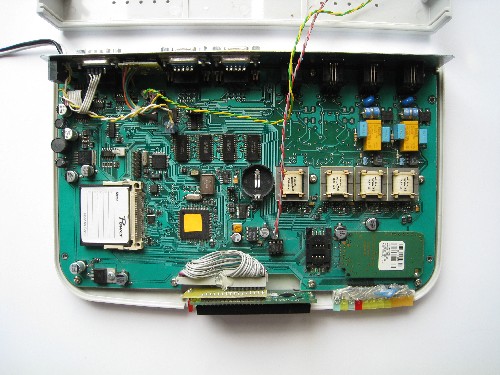Cеntral receiving station for security alarms via radio channel, telephone line and GSM channel

|
TECHNICAL DESCRIPTION OF CENTRAL RECEIVING STATION
FOR SECURITY ALARMS VIA RADIO CHANNEL,
TELEPHONE LINE AND GSM CHANNEL (CSRTGSM Vers. 0)
The central receiving station is a multichannel and multiprotocol device, providing capabilities for supervision and guarding of sites using radio channel, telephone line and the GSM network. The device is implemented using up-to-date components base, while the processing of the received signals is carried out by a powerful signal processor, offering reliable decoding of the signals under the conditions of heavy interference in the radio channels, reception of signals, sent via telephone lines both directly and after multiplexing equipment. The device has built-in up-to-date GSM module to allow reception of signals, originating from sites, monitored via GSM channel.
The device operates in two basic modes – autonomous, or jointly using security systems software. In the first operating mode the received signals are displayed by means of LCD display unit with two lines, showing additional information about the channel, where the signal has originated, its intensity, number of words, which protocol is it based on etc. In case of a computer, connected to the device and provided with appropriate software as SIMS, SIMSII, LARS etc. it is possible to use it together with the above mentioned programs.
The main equipment is powered from +12 VDC power supply and the power consumption, depending on the activated channels, is between 0.15 A and 0.25 A. This provides the device with the capability for longer operation in case of power failure of the mains supply.
Technical parameters of the device:
| Power supply |
+10/ +15 VDC |
|
Power consumption |
0.15 A / 0.3 A |
|
Output interface to an external computer |
RS232 |
|
Output interface to a terminal device |
RS232 |
|
Output interface to engineering computer |
RS232 |
|
Size of the operative buffer for received messages |
1500 events |
|
Number of the independent input channels Radio/ Telephone |
4 |
|
GSM inputs - independent |
1 |
|
Filtering of received messages by radio |
150 seconds |
|
Built-in display |
LCD 2 x 16 |
|
Audible indication in autonomous mode of operation |
32 dB |
|
Control against interferences over the radio channels |
|
|
Control of the used telephone lines |
|
|
Control regarding the availability of GSM network |
|
|
Built-in real-time clock |
|
|
Supported radio protocols: |
|
|
- LARS supports measurements of the signal intensity from repeaters KEL780 |
|
|
- DSC 1.3, 1.4 |
|
|
- LBS – indicated directly received signal/ repeater |
|
|
- Informer 1200 – supports indication about the signal intensity of a specific repeater |
|
|
- LBO – supports measurements of the signal intensity from repeaters |
|
|
Supported protocols over telephone line: |
4+2 |
|
|
10, 15, 20, 30, 40 bps |
|
|
4+2+P |
|
|
10, 15, 20, 30, 40 bps |
|
|
DTMF 4+2+P |
|
|
DTMF 8+1 |
|
|
CONTACT id |
|
Handshake 1400 Hz / 2300 Hz / AUTO |
|
|
Ademco slow, Silent Knight fast, SESCOA, ADEMCO Express, ADEMCO CONTACT id, ADEMCO CONTACT custom, Radionics, Franklin, DCI, VERTEX FBI etc. |
|
|
Support CALLER id over the telephone lines and GSM channel |
|
|
Number of serviced sites |
9999 |
|
Information over technical interface - radio |
Site |
|
|
Event |
|
|
Intensity in dB |
|
|
Number of words |
|
|
Channel |
|
|
Protocol |
|
|
Directly/ repeater |
|
|
Type of transmitter |
|
Information over technical interface - telephone |
Site |
|
|
Event |
|
|
Intensity in dB |
|
|
Number of words |
|
|
Channel |
|
|
Protocol |
|
|
CALLER id |
|
Information over technical interface - GSM |
Site |
|
|
Event |
|
|
Intensity in dB |
|
|
CALLER id |
|
|
Protocol |
|
Built-in audio control |
4 channels / 0.5 W |
|
Indication about the condition of the telephone lines |
LED indicators |
|
Indication about the condition of the radio channels |
LED indicators |
|
Indication about the condition of the GSM channels |
LED indicators |
|
Indication about the condition of base computer |
LED indicators |
|
Built-in archive of events from sites and the system |
128 Mbytes/ 512 Mbytes |